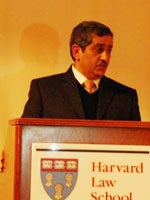Before Dr. Mansoor al-Jamri founded Al-Wasat newspaper in 2002, there were only two Arabic newspapers in Bahrain. Each evening, the government sent those papers content—stories, pictures, headlines and captions—for the next day’s editions. The first few pages of both papers were thus identical. Al-Jamri, recognizing the need for independent news reporting, turned down an opportunity to become a cabinet minister in order to launch Al-Wasat, which is the only independent newspaper in Bahrain.
The recent recipient of the Committee to Protect Journalists 2011 International Press Freedom Award, al-Jamri visited Harvard Law School on Nov. 28 to discuss the fight for human rights and press freedom in Bahrain in light of the Arab Spring uprisings.
Mere months after al-Jamri founded Al-Wasat, King Hamad bin Isa Al Khalifa issued an extraordinarily restrictive law governing the press and free expression. Among other things, the law prohibited journalists from criticizing any head of state with an embassy in Bahrain and imposed liability under the penal code for publishing any information that did not come in writing from an official government source. But the law was not strictly enforced until March 2011, when the government of Bahrain began its crackdown in response to the Arab Spring demonstrations. The Al-Wasast printing press was attacked and destroyed, and hundreds of vigilantes encircled the area, preventing al-Jamri and his employees from entering the offices.
“One of our photographers had camera smashed into his head and needed hospitalization, several distributors were beaten, and one columnist disappeared for a month. But under all of these circumstances, we continued,” he said.
Al-Jamri and two other Al-Wasat editors were eventually arrested and criminally charged with publishing false news. He was forced to resign from his position as editor-in-chief, and his paper was hijacked by the government. He was reinstated in August. Though the situation at Al-Wasat has improved, the state of human rights and other liberties in Bahrain is still grim. NGOs have been shut down and the government is instead creating human rights and other organizations – organizations with little transparency or any real incentive to work on behalf of the people who need them.
“People have seen hell. We’ve seen people killed, we’ve seen curfews, we know that people could be shot dead or disappear at a checkpoint,” al-Jamri said. “Society is crippled.”
He called for the government of Bahrain to create more transparency and relax surveillance of its citizens, but said he knows that, given the current state of affairs and understandably low morale of the people of Bahrain, it will take revolutionary action to fix the social contract between the government and the people.
The event was jointly sponsored by the Harvard Law & International Development Society, the HLS Human Rights Program, the Center for Middle Eastern Studies, The Nieman Foundation for Journalism, the Islamic Legal Studies Program, the Middle East Initiative at the Harvard Kennedy School, The Shorenstein Center, the Middle Eastern Law Students Association, and The Prince al Waleed bin Talal Islamic Studies Program.
